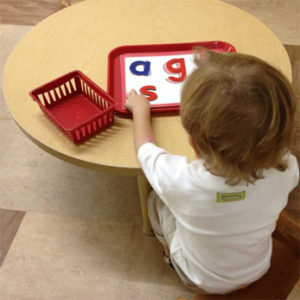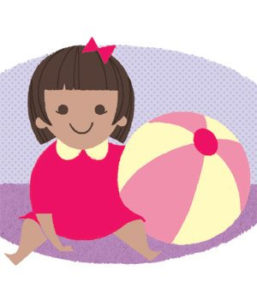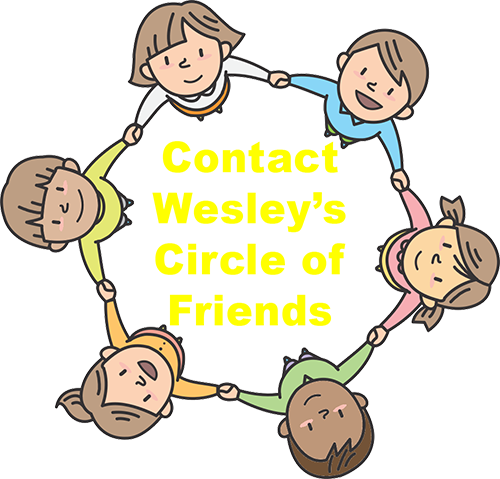Introduction
 In the toddler room we provide a safe and nurturing environment. We encourage free exploration of the child’s surroundings, and provide open ended activities to foster creativity. We use music daily to encourage language, movement, and stimulate the imagination. We expose the children to a variety of activities in our indoor gym and outdoor playground to help develop fine and gross motor skills. Play is encouraged and used as a teaching tool to develop the “Whole” child or holistic approach. This means we understand that a toddler must first feel secure, and then the child will explore. Next, the child will begin to trust, and we can motivate the child to try something new. Last, the child will feel safe to explore on their own and expand their knowledge of the world around them. We strive to develop the child in the following four areas: Gross Motor, Fine Motor, Social/Emotional Development, and Cognitive.
In the toddler room we provide a safe and nurturing environment. We encourage free exploration of the child’s surroundings, and provide open ended activities to foster creativity. We use music daily to encourage language, movement, and stimulate the imagination. We expose the children to a variety of activities in our indoor gym and outdoor playground to help develop fine and gross motor skills. Play is encouraged and used as a teaching tool to develop the “Whole” child or holistic approach. This means we understand that a toddler must first feel secure, and then the child will explore. Next, the child will begin to trust, and we can motivate the child to try something new. Last, the child will feel safe to explore on their own and expand their knowledge of the world around them. We strive to develop the child in the following four areas: Gross Motor, Fine Motor, Social/Emotional Development, and Cognitive.
Gross Motor:
- Learn to walk independently
- Run fairly well
- Walk up and down steps while holding a hand for assistance
- Improve balance through jumping and running exercises
- Learn to climb a ladder and slide down a small slide independently
- Seat self in a small chair
- Squat to pick up something
- Kick a ball
- Throw a ball forward
- Use ride on toys with little assistance
- Stand on tip toes with some support
- Crawl through a tunnel
- Dance to music
- Push or pull a toy while walking
Fine Motor:
- Hold a crayon and scribble on paper
- Hold a paint brush and paint using the whole arm to move the brush
- Use a spoon with some success
- Use a fork with support
- Hold own cup and drink, may have spillage
- Grab a sponge and dab on paper with support
- Point using pointer finger
- Point to pictures in a book
- Pinch pompoms or small objects and place them in a cup
- Stack at least two blocks to make a tower
- Put a simple hat on head
- Remove socks and /or simple shoes
- Begin to turn knobs
- Turn pages in a book, a couple at a time
Social/Emotional Development:
- Recognizes own face when looking in a mirror
- Recognize familiar faces and smile or react to show recognition
- Will begin to use names to address classmates and teachers
- With support interact positively with other children through play and activities
- Will discover that they can play alone or entertain self for a few minutes
- With support learn daily routine and how to transition from one activity to another
- Learn to share with support
- Learn to take turns with assistance
- Manners will be modeled in the classroom
- Learn to eat a snack independently while sitting in a chair
- Develop emotions and learn to express them within certain limits
- Begin to develop a sense of independence through crafts and activities
- Begin to imitate or repeat actions or words of adults
- Begin to imitate actions or words of classmates
- Will be encouraged to select a book and then it will be read to the child
- Will be encouraged to try new activities
- Will be encouraged to explore the world inside the school and outside around the school with support
- Will be comforted when feeling negative emotions
- Will be encouraged and shown ways to solve problems
- Will be encouraged to express emotions through dance during music time
Cognitive:
- Understand cause and effect by finding new ways to play with toys
- Begin to show interest in counting by identifying one, two, or three objects
- Begin to sort and classify objects
- Will be able to complete simple puzzles
- Begin to learn words and repeat them often
- Begin to recognize familiar items in books
- Begin to ask one or two word questions….Why?……..I go?
- Will be encouraged to respond to simple commands
- Will begin to understand simple phrases
- Play will become more complex and sequential
- Will be encouraged to use items in different ways to foster imagination
- Will be encouraged and praised for choosing correct behaviors

